#the role you were born to play
Text
The Ultimate Episode Tournament: Round 1 Match 57


13 notes
·
View notes
Text

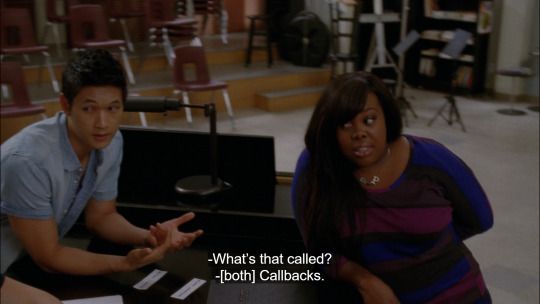
GLEE S04E05 The Role You Were Born To Play
15 notes
·
View notes
Text
I think this new Ryder guy might be into Finn 👀 Am I sensing some vibes??
3 notes
·
View notes
Text

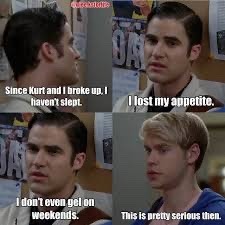


Gifs Wikifandom
Picuki.com
4 notes
·
View notes
Text

yearning and grief or somthing . whatever .
#sorry i know we dont really know what happened to hb and cd in the ddd timeline but . i just like making shit up#its just. we know so little#why not just go crazy with it#oh this line from diamonds dames and dads inspired this#it feels like you were born for it#folded out of clay and stardust and molded into a shape#a gun placed in your hand and aimed at his enemies#destined to play the same role#the same games#the same capers again and again and again."#fuck my baka life#homestuck#diamonds droog#diamonds dames and dads#homestuck beyond canon#i mean#yeah#peace out im sleepg#bonkaroonies scribbles
94 notes
·
View notes
Text
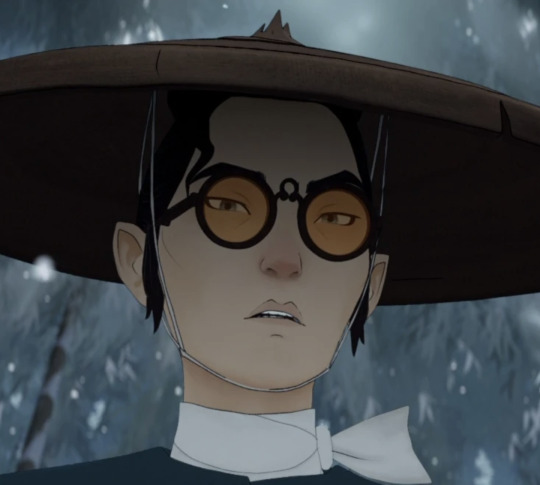
I watched all eight episodes of season 1 of Blue Eye Samurai over the weekend. I then went browsing because I wanted to read some online reviews of the show to see what people were thinking of it and also because I wanted to interact with gifs and art, as the series is visually stunning.
Yet, in my search for opinions on the show, I came across several points I'd like to address in my own words:
Mizu’s history and identity are revealed piece-by-piece and the “peaches” scene with Mizu and Ringo at the lake is intended to be a major character reveal. I think it’s weird that some viewers got angry over other viewers intentionally not gendering Mizu until that reveal, rather than immediately jumping to gender the character as the other characters in the show do. The creators intentionally left Mizu’s gender and sexuality ambiguous (and quite literally wrote in lines to lead audiences to question both) to challenge the viewer’s gut assumption that this lone wolf samurai is a man. That intentional ambiguity will lead to wide and ambiguous interpretations of where Mizu fits in, if Mizu fits in at all. But don't just take my word for this:
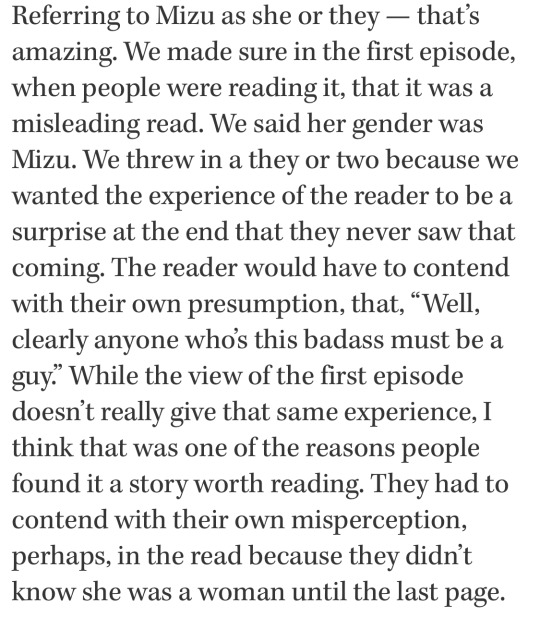
Re: above. I also think it’s weird that some viewers got upset over other viewers continuing to acknowledge that Mizu has a very complicated relationship with her gender, even after that reveal. Canonically, she has a very complicated relationship with her identity. The character is intended to represent liminality in identity, where she’s often between identities in a world of forced binaries that aren’t (widely) socially recognized as binaries. But, again, don’t just take my word for this:
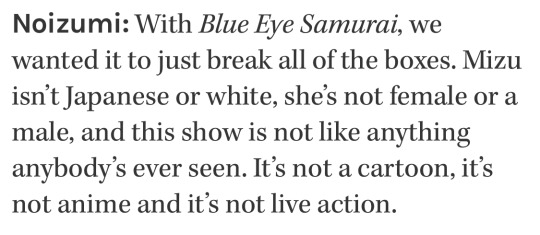
Mizu is both white and Japanese, but she is also not white and not Japanese simultaneously (too white to be Japanese and too Japanese to be white). She’s a woman and a man. She’s a man who’s a woman. She’s also a woman who’s not a woman (yet also not quite a man). But she’s also a woman; the creators said so. Mizu was raised as a boy and grew into a man, yet she was born a girl, and boyhood was imposed upon her. She’s a woman when she’s a man, a man when she’s a man, and a woman when she’s a woman.
Additionally, Mizu straddles the line between human and demon. She’s a human in the sense she’s mortal but a demon in the sense she’s not. She's human yet otherworldly. She's fallible yet greatness. She's both the ronin and the bride, the samurai and the onryō. In short, it’s complicated, and that’s the point. Ignoring that ignores a large part of her internal character struggle and development.
Mizu is intended to represent an “other,” someone who stands outside her society in every way and goes to lengths to hide this “otherness” to get by. Gender is a mask; a tool. She either hides behind a wide-brimmed hat, glasses, and laconic anger, or she hides behind makeup, her dress, and a frown. She fits in nowhere, no matter the identity she assumes. Mizu lives in a very different time period within a very different sociocultural & political system where the concept of gender and the language surrounding it is unlike what we are familiar with in our every-day lives. But, again, don’t just take my word for this:
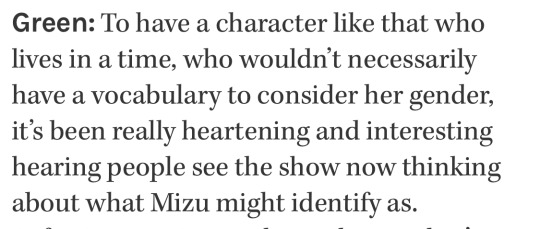
It’s also weird that some viewers have gotten upset over the fact women and queer people (and especially queer women) see themselves in Mizu. Given her complicated relationship with identity under the patriarchy and colonial violence, I think Mizu is a great character for cis-het women and queer folks alike to relate to. Her character is also great for how she breaks the mold on the role of a biracial character in narratives about identity (she’s not some great bridge who will unite everyone). It does not hurt anyone that gender-fluid and nonbinary people see themselves in Mizu's identity and struggle with identity. It does not hurt anyone that lesbians see themselves in the way Mizu expresses her gender. It does not hurt anyone that trans men see themselves in Mizu's relationship with manhood or that trans women can see themselves in Mizu when Mama forces her to be a boy. It's also really cool that cis-het women see themselves in Mizu's struggles to find herself. Those upset over these things are missing critical aspects of Mizu's character and are no different from the other characters in the story. The only time Mizu is herself is when she’s just Mizu (“…her gender was Mizu”), and many of the other characters are unwilling to accept "just Mizu." Accepting her means accepting the complicatedness of her gender.
Being a woman under the patriarchy is complicated and gives women a complicated relationship with their gender and identity. It is dangerous to be a woman. Women face violence for being women. Being someone who challenges sex-prescribed norms and roles under patriarchy also gives someone a complicated relationship with their identity. It is dangerous to usurp gender norms and roles (then combine that with being a woman...). People who challenge the strict boxes they're assigned face violence for existing, too. Being a racial or ethnic minority in a racially homogeneous political system additionally gives someone a complicated relationship with their identity. It is dangerous to be an ethnic minority when the political system is reproduced on your exclusion and otherness. They, too, face violence for the circumstances of their birth. All of these things are true. None of them take away from the other.
Mizu is young-- in her early 20s-- and she has been hurt in deeply affecting ways. She's angry because she's been hurt in so many different ways. She's been hurt by gender violence, like "mama's" misogyny and the situation of her birth (her mother's rape and her near murder as a child), not to mention the violent and dehumanizing treatment of the women around her. She's been hurt by racial violence, like the way she has been tormented and abused since childhood for the way she looks (with people twice trying to kill her for this before adulthood). She's been hurt by state-sanctioned violence as she faces off against the opium, flesh, and black market traders working with white men in contravention of the Shogun's very policies, yet with sanction from the Shogun. She's been hurt by colonial violence, like the circumstances of her birth and the flood of human trafficking and weapons and drug trafficking in her country. She's had men break her bones and knock her down before, but only Fowler sexually differentiated her based on bone density and fracture.
Mizu also straddles the line between victim and murderer.
It seems like Mizu finding her 'feminine' and coming to terms with her 'female side' may be a part of her future character development. Women who feel caged by modern patriarchal systems and alienated from their bodies due to the patriarchy will see themselves in Mizu. They understand a desire for freedom that the narrow archetypes of the patriarchy do not afford them as women, and they see their anger and their desire for freedom in Mizu. This, especially considering that Mizu's development was driven by one of the creators' own experiences with womanhood:
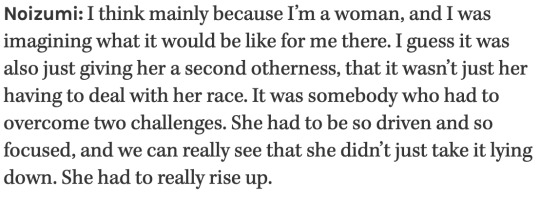
No, Mizu does not pass as a man because she "hates women" or because she hates herself as a woman or being a woman. There are actual on-screen depictions of Mizu's misogyny, like her interactions with Akemi, and dressing like a man is not an instance of this. Mizu shows no discomfort with being a woman or being seen as a woman, especially when she intends to pass herself as and present as a woman. Mizu also shows the women in the series more grace and consideration than any man in the show, in whatever capacity available to her socially and politically, without revealing herself; many of the women have remarked that she is quite unlike other men, and she's okay with that, too.
When she lives on the farm with Mama and Mikio, Mizu shows no discomfort once she acclimates to the new life. But people take this as conclusive evidence of the "only time" she was happy. She was not. This life was also a dance, a performance. The story of her being both the ronin and the onryō revealed to the audience that this lifestyle also requires her to wear a mask and dance, just as the bride does. This mask is makeup, a wedding dress, and submission, and this performance is her gender as a wife. She still understands that she cannot fully be herself and only begins to express happiness and shed her reservation when she believes she is finally safe to be herself. Only to be betrayed. Being a man is her safety, and it is familiar. Being a boy protected her from the white men as a child, and it might protect her heart now.
Mizu shows no discomfort with being known as a woman, except when it potentially threatens her goals (see Ringo and the "peaches" scene). She also shows no discomfort with being known as, seen as, or referred to as a man. As an adult, she seems okay- even familiar- with people assuming she's a man and placing her into the role of a man. Yet, being born a girl who has boyhood violently imposed upon her (she did not choose what mama did to her) is also an incredibly important part of her lived experience. Being forced into boyhood, but growing into a man anyway became part of who she is. But, being a man isn’t just a part of who she became; it’s also expedient for her goals because men and women are ontologically different in her world and the system she lives under.
She's both because she's neither, because- ontologically- she fits nowhere. When other characters point out how "unlike" a man she is, she just shrugs it off, but not in a "well, yeah, because I'm NOT a man" sort of way, but in an "I'm unlike anyone, period," sort of way. She also does not seem offended by Madam Kaji saying that Mizu’s more man than any who have walked through her door.
(Mizu doesn’t even see herself as human, let alone a woman, as so defined by her society. And knowing that creators have stated her future arc is about coming into her “feminine era” or energy, I am actually scared that this show might fall into the trope of “domesticating”/“taming” the independent woman, complete with an allegory that her anger and lack of human-ness [in Mizu’s mind] is a result of a woman having too much “masculine energy” or being masculine in contravention of womanness.)
Some also seem to forget that once Mama and Mikio are dead, no one knows who she is or where she came from. They do not have her background, and they do not know about the bounty on her (who levied the bounty and why has not yet been explained). After their deaths, she could have gone free and started anew somehow. But in that moment, she chose to go back to life as a man and chose to pursue revenge for the circumstances of her birth. Going forward, this identity is no longer imposed upon her by Mama, or a result of erroneous conclusions from local kids and Master Eiji; it was because she wanted people to see her as a man and she was familiar with navigating her world, and thus her future, as a man. And it was because she was angry, too, and only men can act on their anger.
I do think it important to note that Mizu really began to allow herself to be vulnerable and open as a woman, until she was betrayed. The question I've been rattling around is: is this because she began to feel safe for the first time in her life, or is this part of how she sees women ontologically? Because she immediately returns to being a man and emotionally hard following her betrayal. But, she does seem willing to confide in Master Eiji, seek his advice, and convey her anxieties to him.
Being a man also confines Mizu to strict social boxes, and passing herself as a man is also dangerous.
Mizu doesn't suddenly get to do everything and anything she wants because she passes as a man. She has to consider her safety and the danger of her sex being "found out." She must also consider what will draw unnecessary attention to her and distract her from her goals. Many viewers, for example, were indignant that she did not offer to chaperone the mother and daughter and, instead, left them to the cold, only to drop some money at their feet later. The indignity fails consider that while she could bribe herself inside while passing as a man, she could not bribe in two strangers. Mizu is a strange man to that woman and does not necessarily have the social position to advocate for the mother and daughter. She also must consider that causing small social stirs would distract from her goals and draw certain attention to her. Mizu is also on a dangerous and violent quest.
Edo Japan was governed by strict class, age, and gender rules. Those rules applied to men as well as women. Mizu is still expected to act within these strict rules when she's a man. Being a man might allow her to pursue revenge, but she's still expected to put herself forward as a man, and that means following all the specific rules that apply to her class as a samurai, an artisan (or artist), and a man. That wide-brimmed hat, those orange-tinted glasses, and her laconic tendencies are also part of a performance. Being a boy is the first mask she wore and dance she performed, and she was originally (and tragically) forced into it.
Challenging the normative identities of her society does not guarantee her safety. She has limitations because of her "otherness," and the transgression of sex-prescribed roles has often landed people in hot water as opposed to saving them from boiling. Mizu is passing herself off as a man every day of her life at great risk to her. If her sex is "found out" on a larger scale, society won’t resort to or just start treating her as a woman. There are far worse fates than being perceived as a woman, and hers would not simply be a tsk-tsk, slap on the wrist; now you have to wear makeup. Let's not treat being a woman-- even with all the pressures, standards, fears, and risks that come with existing as a woman-- as the worst consequence for being ‘found out’ for transgressing normative identity.
The violence Mizu would face upon being "found out" won’t only be a consequence of being a "girl." Consider not just the fact she is female and “cross-dressing” (outside of theater), but also that she is a racial minority.
I also feel like many cis-het people either ignore or just cannot see the queerness in challenging gender roles (and thus also in stories that revolve around a subversion of sex-prescribed gender). They may not know how queerness-- or "otherness"-- leads to challenging strict social stratifications and binaries nor how challenging them is seen by the larger society as queer ("strange," "suspicious," "unconventional," even "dishonorable," and "fraudulent"), even when "queerness" (as in LGBTQ+) was not yet a concept as we understand it today.
Gender and sexuality- and the language we use to communicate who we are- varies greatly across time and culture. Edo Japan was governed by strict rules on what hairstyles, clothes, and weapons could be worn by which gender, age, and social group, and this was often enshrined in law. There were specific rules about who could have sex with whom and how. These values and rules were distinctly Japanese and would not incorporate Western influences until the late 1800s. Class was one of the most consequential features to define a person's fate in feudal Japan, and gender was quite stratified. This does not mean it's inappropriate for genderqueer people to see themselves in Mizu, nor does this mean that gender-variant identities didn’t exist in Edo Japan.
People in the past did not use the same language we do today to refer to themselves. Example: Alexander The Great did not call himself a "bisexual." We all understand this. However, there is a very weird trend of people using these differences in language and cultures across time to deny aspects of a historical person's life that societies today consider taboo, whether these aspects were considered taboo during that historical time period or not. Same example: people on Twitter complaining that Netflix "made" Alexander The Great "gay," and after people push back and point out that the man did, in fact, love and fuck men, hitting back with "homosexuality wasn't even a word back then" or "modern identity didn't exist back then." Sure, that word did not exist in 300s BCE Macedonia, but that doesn't mean the man didn't love men, nor does that mean that we can't recognize that he'd be considered "queer" by today's standards and language.
Genderqueer, as a word and as the concept is understood today, did not exist in feudal Japan, but the people did and feudal Japan had its own terms and concepts that referred to gender variance. But while the show takes place in Edo Japan, it is a modern adult animation series made by a French studio and two Americans (nationality). Mizu is additionally a fictional character, not a historical figure. She was not created in a vacuum. She was created in the 21st century and co-written by a man who got his start writing for Sex in the City and hails from a country that is in the midst of a giant moral panic about genderqueer/gender-variant people and gender non-conforming people.
This series was created by two Americans (nationality) for an American company. In some parts of that country, there are laws on the book strictly defining the bounds of men and women and dictating what clothes men and women could be prosecuted for wearing. Changes in language and identity over time mean that we can recognize that if Mizu lived in modern Texas, the law would consider her a drag performer, and modern political movements in the show creators' home country would include her under the queer umbrella.
So, yeah, there will also be genderqueer people who see themselves in Mizu, and there will be genderqueer fans who are firm about Mizu being queer to them and in their “headcanons.” The scene setting being Edo Japan, does not negate the modern ideas that influence the show. "Nonbinary didn't exist in Edo Japan" completely ignores that this show was created to explore the liminality of modern racial, gender, class, and normative identities. One of the creators was literally inspired by her own relationship with her biracial identity.
Ultimately, the fact Mizu, at this point in her journey, chooses to present and pass as a man and the fact her presented gender affects relationship dynamics with other characters (see: Taigen) gives this story a queer undertone. And this may have been largely unintentional: "She’s a girl, and he’s a guy, so, of course, they get together," < ignoring how said guy thinks she’s a guy and that she intentionally passes herself as a guy. Audiences ARE going to interpret this as queer because WE don’t live in Edo-era Japan. And I feel like people forget that Mizu can be a woman and the story can still have queer undertones to it at the same time.
#Blue Eye Samurai#‘If I was transported back in time… I’d try to pass myself off as a man for greater freedom.’#^^^ does not consider the intersection of historically queer existence across time with other identities (& the limitations those include)#nor does it consider the danger of such an action#I get it. some come to this conclusion simply because they know how dangerous it is to be a woman throughout history.#but rebuking the normative identities of that time period also puts you at great risk of violence#challenging norms and rules and social & political hierarchies does not make you safer#and it has always been those who exist in the margins of society who have challenged sociocultural systems#it has always been those at greatest risk and who've faced great violence already. like Mizu#Anyway... Mizu is just Mizu#she is gender queer (or gender-variant)#because her relationship with her gender is queer. because she is gender-variant#‘queer’ as a social/political class did not exist. but people WE understand as queer existed in different historical eras#and under different cultural systems#she’s a woman because queer did not exist & ‘woman’ was the sex caste she was born into#she’s also a woman because she conceptualizes herself as so#she is a woman AND she is gender-variant#she quite literally challenges normative identity and is a clear example of what sex non-conforming means#Before the actual. historic Tokugawa shogunate banned women from theater#there were women in the theater who cross-dressed for the theater and played male roles#so I’m also really tired of seeing takes along the lines of: ‘Edo Japan was backwards so cross dressers did’t exist then!’#like. please. be more transparent won’t you?
16 notes
·
View notes
Text


#glee#glee song tournament#glee polls#blaine anderson#mercedes jones#santana lopez#sugar motta#brittany pierce#group: the troubletones#song: survivor/i will survive#song: hopelessly devoted to you#season 3#3x08#episode: hold on to sixteen#season 4#4x05#episode: the role you were born to play#round 4
30 notes
·
View notes
Text
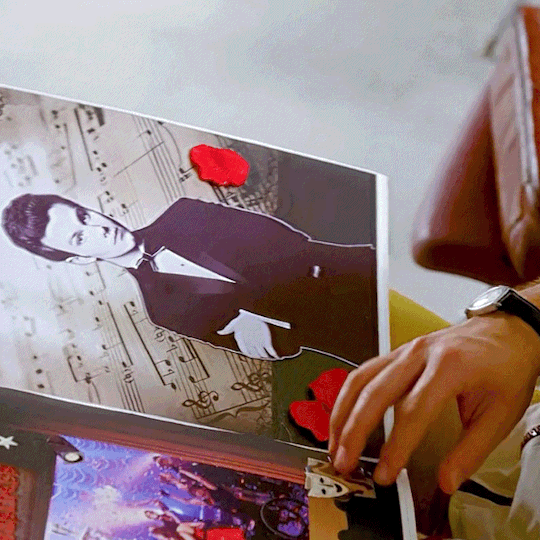

kurt hummel in every performance
4x05 - The Role You Were Born to Play
Hopelessly Devoted to You - Blaine Anderson
“I can't. I'm sorry, I just can't, Finn. I didn't want to let you down, but Grease is a romance, and how can I play any of the scenes if I have ruined mine?” - Blaine Anderson
#glee#kurt hummel#blaine anderson#klaine#song: hopelessly devoted to you#episode: the role you were born to play#kurt hummel in every performance#not blaine’s scrapbook of his ex boyfriend#i’m obsessed with the fact that blaine scrapbooks#he’s just like me fr
22 notes
·
View notes
Text
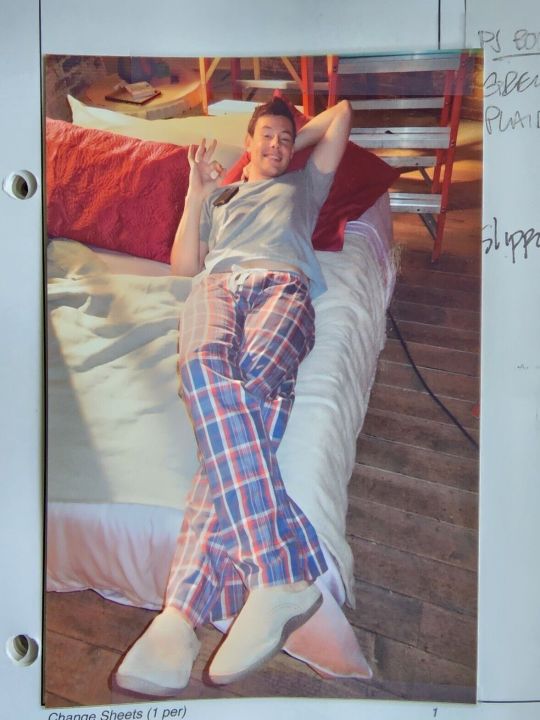



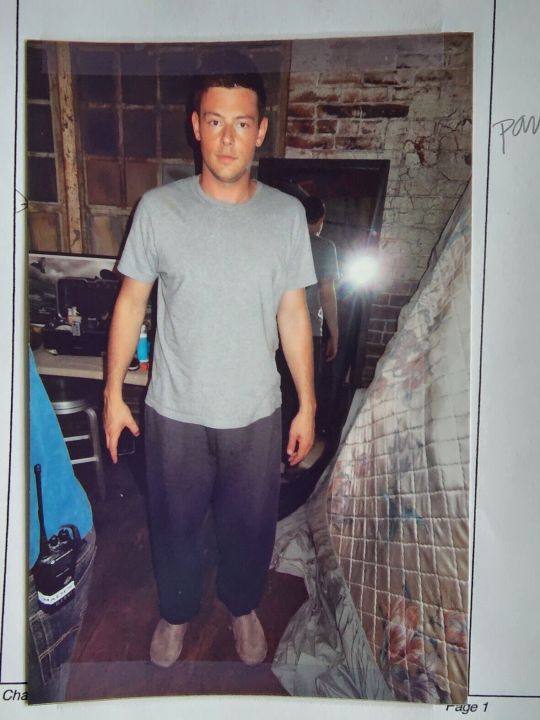
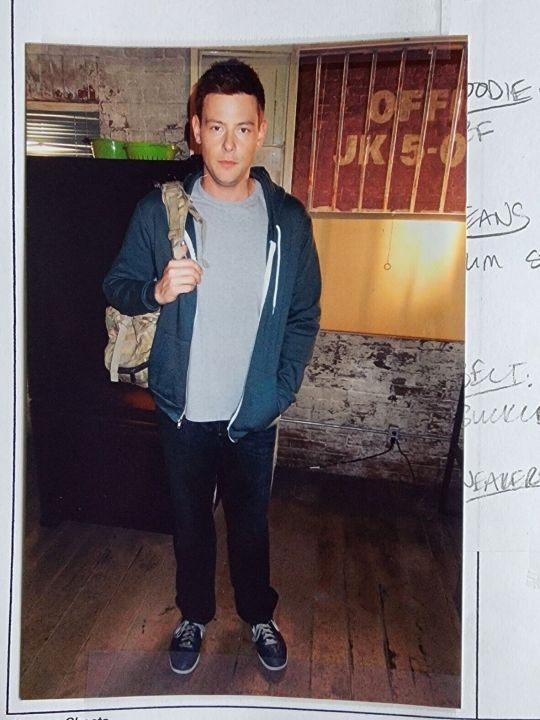
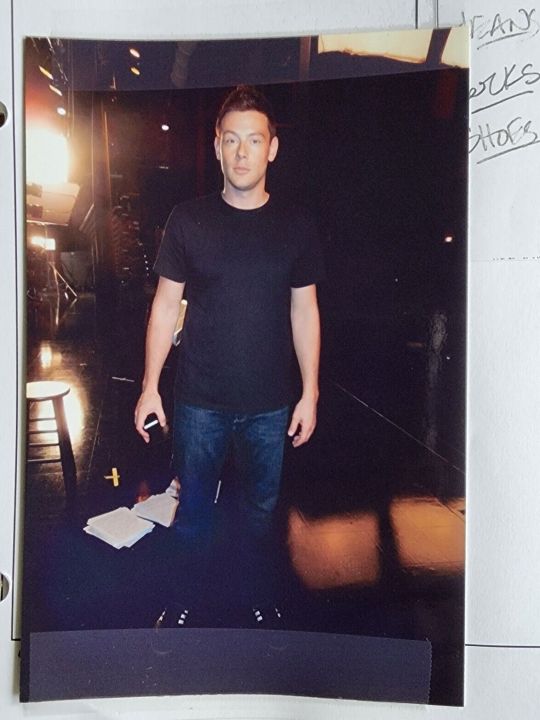
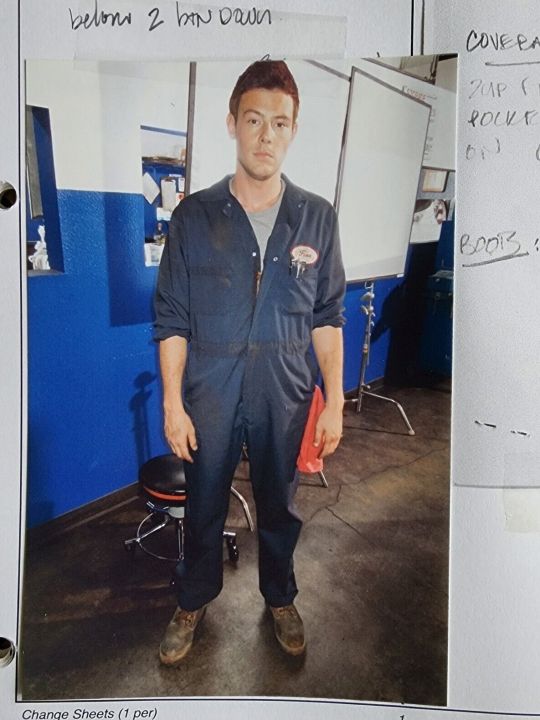



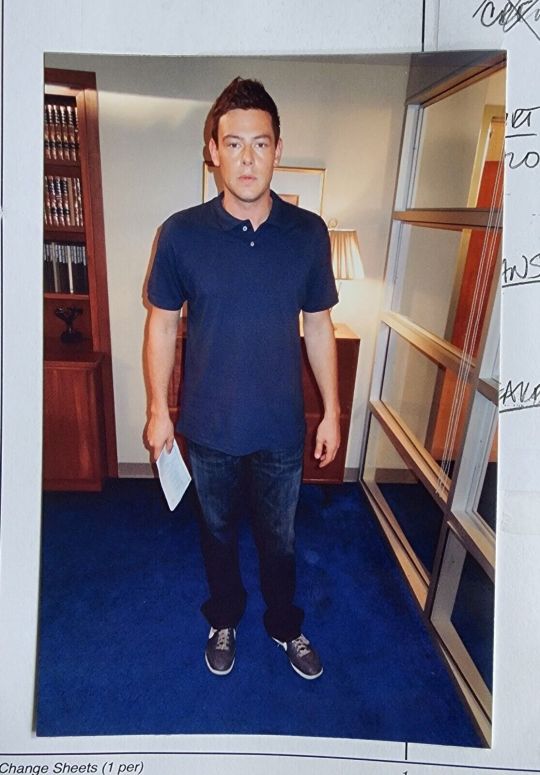
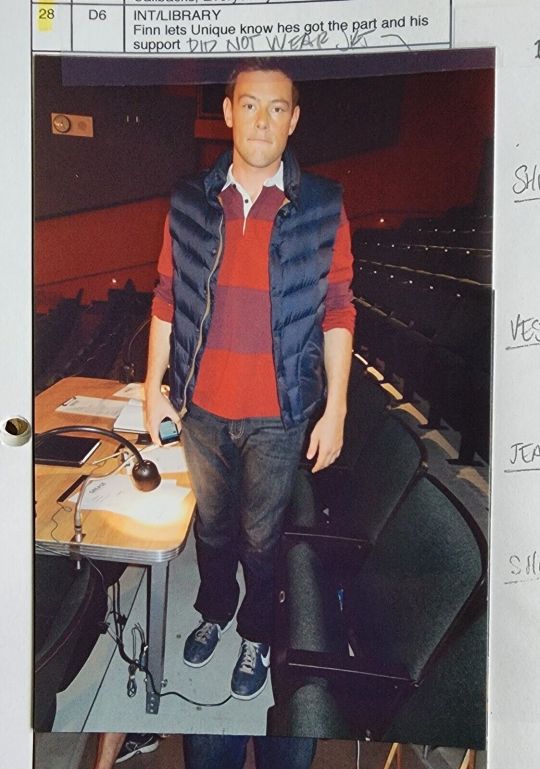
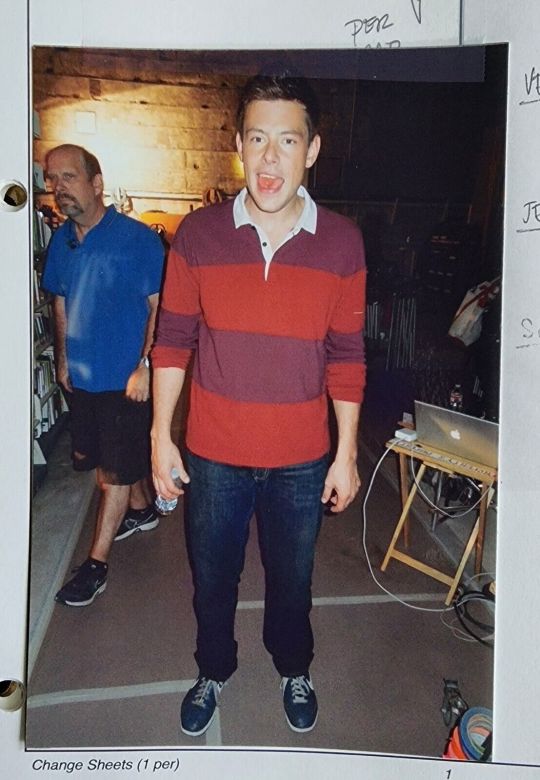


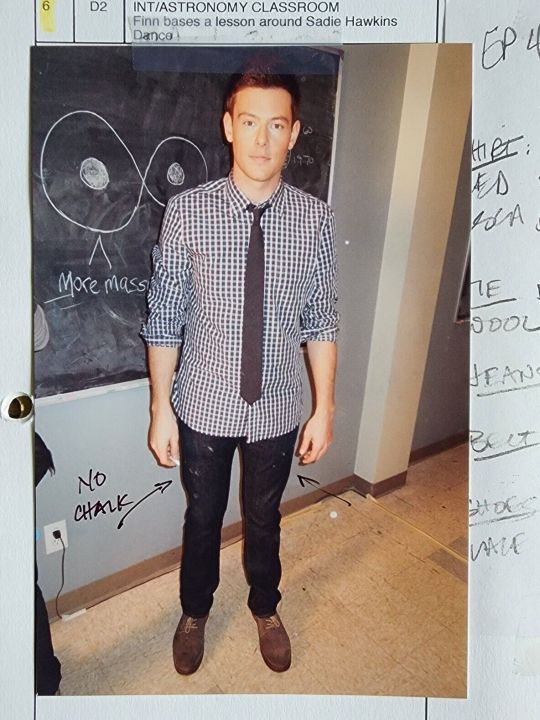

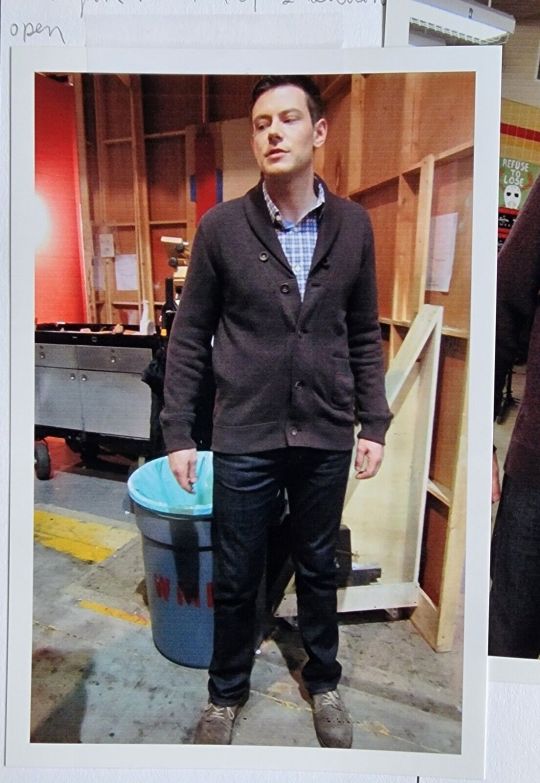
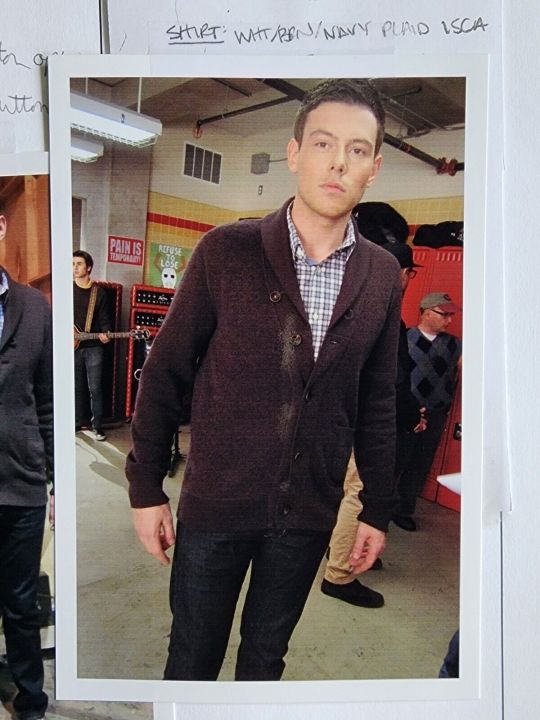
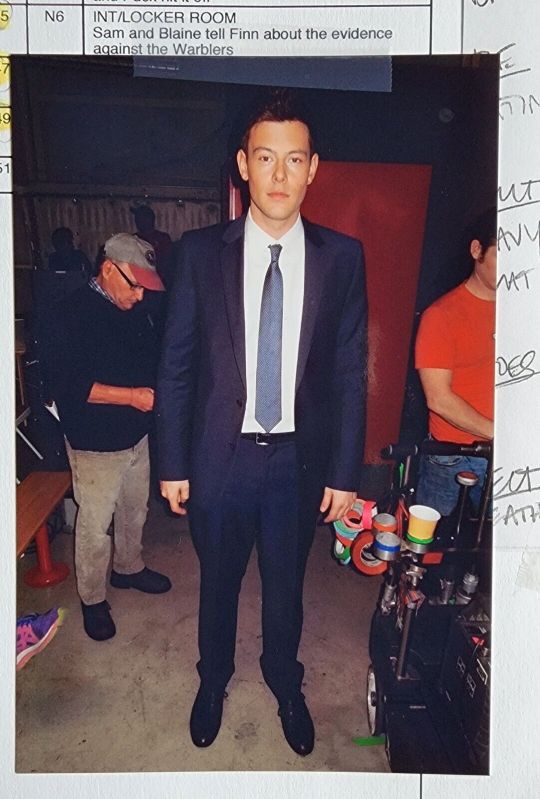
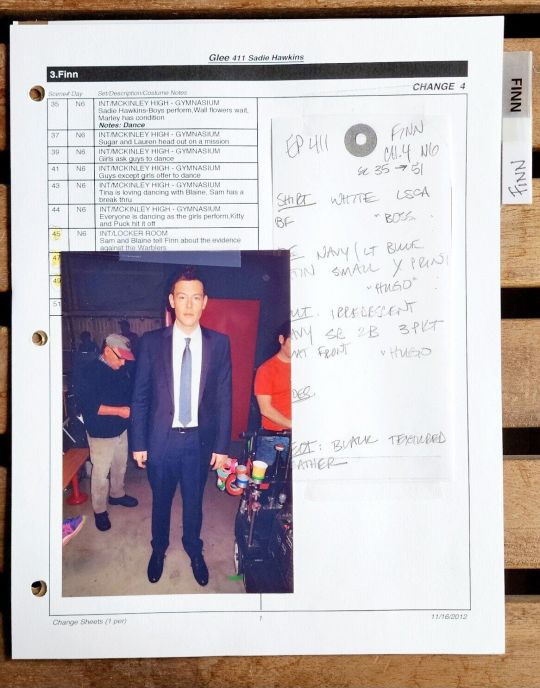
Glee TV Cory Monteith Finn Hudson (+Artie) 21 Rare Unpublished Wardrobe PhotosS4 (x)
#source: glee#ebay#cory monteith#403 makeover#404 the break up#405 the role you were born to play#411 sadie hawkins
53 notes
·
View notes
Text
Ed AND Stede both mask and I wanna talk about it
I know the fandom talks A LOT about Ed being a chameleon, flipping his entire personality on a dime to fit into the current situation and company, to the point that he can't even really recognize when it's happened and how far he's gone.
But I wanna look at it with Stede too. He literally asks his crew in the very first episode to give him constructive criticism so he can change what he is doing to better serve them, but he cannot fathom behaving different on a personality level.
They both mask so heavily, but in different ways. Edward masks with his personality, whereas Stede masks with his actions. And it is absolutely because of where they came from before they meet each other.
-Edward's Mask and His Struggles-
Edward learned to survive as a lower-class, mixed-raced, son of a physically abusive father and indentured mother. When he became a pirate, his survival on the water hinged on performing in a way that pirates approve. It isn't the mainland where you're protected by certain laws, if pirates don't like you, they can just kill you. It's important to be liked on the water. So, being hard, being cruel, being Blackbeard, when the company was right, it allowed him safe passage to climb the ladder and build his legend. He succeeded with that carefully crafted persona entirely devoted to this job.
In contrast, he is allowed mistakes. He may mess up a bit, but we all like Blackbeard. If a raid goes bad, if he gets too drunk, if he acts a bit erratic, if he loses sight of it all, if he faces critique? He's fine. His crew are loyal to the persona he displays and they allow him room to be imperfect because of it.
He is allowed to make mistakes as long as he is good company.
He can put on the right face and say the right things until he goes into crisis because he doesn't know what to do with himself. Because everything is boring to him that he can't force himself to keep doing it any longer. He's so tired.
-Stede's Mask and His Struggles-
Stede learned to survive as a upper-class, white, son of an emotionally abusive father and, as fas as we can tell, complete lack of mother-figure. His entire life has hinged on doing the right things. It's the aristocratic society, he has responsibilities he simply does not have any choice in abandoning. And, as long as he does as he's supposed to, he cannot be harmed. So, he'll be bullied, he'll get married, he'll inherit his family's fortune, he'll father children, he does all the things he has to do to just hold his position in high society and survive in that sort of world. And he does it well enough.
In contrast, he cannot figure out his personality. He cannot master what is it he's suppose to be to make people like him. It's no matter though, he does his job so there's nothing anyone else can do about it. If he's annoying, if he's too soft, if he's dandy, if he's an outcast, if he's not like the other boys? He's fine. He's safe under the veil of a rich man in mainland high society.
He is allowed to be disliked as long as he does what he's supposed to.
He can follow the rules and do all the right things until he can't be Mr. Bonnet because day in and day out he's alienated in his own home. Because he's been trying to find a way to make himself fit with his family and he can't keep trying any more. He's so tired.
-What Their Masks do to Each Other-
So - while Ed comfortably slips between "Blackbeard", "The Mad Devil", "Ed", "Jeff the Accountant", "Captain", "Beardie*", "Edward Teach", "Eddie", "The Kraken" - Stede cannot understand how one files down parts of themselves to fit in different places, to constantly act like someone they're not. He has always been completely himself, even when it doesn't work.
And - while Stede is able to navigate being a family man, starting a pirate crew, inventing people positive management, accepting critique and adjusting to it, smiling in the face of his abusers, learning to stun and kill, understanding and using passive aggression, throwing a fuckery, learning to duel, starting a treasure hunt for Ed, promising to do things he's not sure he can handle - Ed doesn't get how someone just makes themselves do all these different things, half of them things they didn't want to do at all. He has always done as he's wanted, even when it gets risky.
Which is why is it so fascinating that these two forms of masking, the gap between their communication, is what leads them to hurt each other in the last episodes.
Ed tries to be what he thinks Stede wants him to be, throwing away the Blackbeard title and trying to settle down into complete softness... and Stede tries to do what he thinks Ed wants him to do, promises to follow his plan and run away to China despite his anxiety about his family... But these things aren't authentic to themselves.
Edward Teach is a little bit of every persona he wears and a little bit done with the pieces he has grown from. They are all a part of him. And Stede would love them all if Ed shared it. If he trusted him enough to let down the curtain and shake off the performance.
Stede wants to do so many things that he's never spoken of and doesn't want to do so many things he thinks he has to. He just wants to get to chose. And Ed would support him in whatever he wanted if Stede would just tell him how he feels. If he would just be honest and stop forcing himself to do things for other people.
They have both been trying to please each other with the tools they've mastered to please the worlds they came from, but they were effectively lying to each other in a hundred tiny ways. Because they loved each other so much, but they didn't believe they were good enough as they really were.
They thought they needed the masks to keep their lover's affections - But they need to put them down so they can truly see one another.
More OFMD
#Another post analyzing the effects of Ed and Stede's very different traumas and how it shaped them in opposite ways?#it's more likely than you think#They are BOTH autistic and they BOTH heavily mask through out the entire season#They follow different systems and have learned different rules to survive the worlds they were born in#But I only see people wanting to talk about Ed's masking WHEN STEDE DOES IT TOO AND IT'S EQUALLY AS INTERESTING#LEMME TALK ABOUT STEDE AND HOW HE WALKS THROUGH THE WORLD TRYING TO EARN PEOPLE'S APPROVAL TOO#So yeah - I just really wanted a chance to explore all the 'actions' Stede has done over the season#and how - in a lot of them - he is clearly uncomfortable but doesn't allow himself to say no or fight against it#And it's so clear that he just does things that are expected of him - even if he struggles in being the 'person' he's supposed to be#A lot of Stede's life just happens to him - he never had much of a choice in so many parts of it and that doesn't change at sea#And in the exact opposite position#Edward just throws himself into becoming every different person he thinks people want him to be - whether he likes it or not#He doesn't know how to be himself and risk letting people down when they see who that is#so he plays the roles - even does them quite well - even if he struggles with what he things he's 'supposed' to be doing#And he doesn't just 'get fixed' the second he meets Stede - he needs time to understand he's safe#I'm typing a lot of stuff tonight guys#didn't sleep - must keep analyzing OFMD#I'm in THE ZONE#Our Flag Means Death#Our Flag Means Death Spoilers#ofmd#ofmd spoilers#hbo#Stede Bonnet#Edward Teach#Gentleman Pirate#Blackbeard#blackbeard x stede#gentlebeard#blackbonnet
73 notes
·
View notes
Text



Darren Criss as Blaine Anderson | Glee 4.05 'The Role You Were Born To Play' and 4.06 'Glease' | Wardrobe Photos
#Darren Criss#Blaine Anderson#4.05 the role you were born to play#4.06 glease#glee bts#glee wardrobe#hopelessly devoted to you 🎶#😭❤️🩹#please do not repost
19 notes
·
View notes
Text

GLEE S04E05 The Role You Were Born To Play
17 notes
·
View notes
Text
Oh my god this Kitty character is the absolute worst! So far she's shown us she's a white supremacist, super religious, bigoted towards gay people, transphobic. What else is she gonna say?? 😡🙄
1 note
·
View note
Text

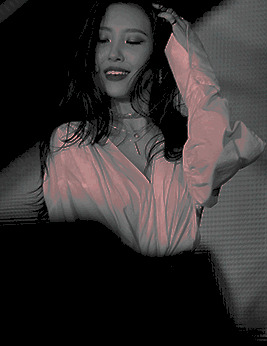

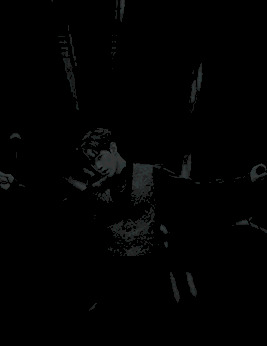

taiara vamp!verse inspo for @uroborosymphony .
#did i do this instead of writing? yes....#i'M GOING TO BEA TMY OWN ASS..#but at least it only took a couple of minutes asjjaj#hehe i have SO many more pictures i can use !! and will 8 )#in the futureeee#i'm telling you; it's the role these 2 were born to play asjajj#imgs.#┍━━━━━»•» ♡զմιɳɳ ╭──╯ . . . ❤ 𝙢𝙖𝙙𝙡𝙮 𝘪𝘯 𝘭𝘰𝘷𝘦 ━ ◦ ❖ ◦ ━ 𝘷𝘪𝘳𝘵𝘶𝘰𝘶𝘴𝘭𝘺 𝘰𝘳 𝘥𝘪𝘢𝘣𝘰𝘭𝘪𝘤𝘢𝘭𝘭𝘺#uroborosymphony#giving me mad spike/drusilla vibes and i'm living for it .#edits.
5 notes
·
View notes
Text
welp. confirmed: family members visibly distraught with casual segway into talking health care options and gender affirming care in general sense
ayo fam stalking this tumblr maybe? because I never in my life have worn the type of pink floral clothes I am suddenly gifted along with dropping comments that Women do this while Men go fishing on vacation etc.
#I rly don't understand why my mum is okay with Gay or Lesbian but bisexuality is not a thing and transness is not “a thing” unless it's like#welp Ellen DeGeneres flavored understanding where women can be born Weird and you can tell from a kid photo that it's a Pants woman#who marries a Dress Woman#gender roles still staunch just being aberrant where one woman is The Man in wlw couple and one guy is Woman-ish in mlm relations#and it's always this dichotomy of hyper feminine or masculine and “you can just tell” if a person has ?? medical condition of Body Swapped#like a baby or kid is supposed to be loudly Gay and/or other gender because ofccccc shy or anxious children don't try to conform all their#life and still don't match on the inside but hide it#family can only conceive of flaming and confident Gays (tm) which is an acceptable affliction? wtf wtf wtf wtf#they used to be better about this I thought#though they struggled with the queer “scene” when sib's band put out a CD with a cover that was glitter lipstick on the scruffy dude -#but ig since they can say my sib is “just” a lesbian tough woman she's okay - but the band and lipstick guy were Ew and rrrrdddffjkhfg#you get it#I hate people sometimes I really just#I can't touch discourse with a 10ft pole because it's a minefield but tldr bi-erasure plays into the whole a “Good Gay” vs “weirdo pervert”#and fuck thisssssss#overly personal on my shadow banned bloggo
1 note
·
View note
Text
HOW TO GIVE PERSONALITY TO A CHARACTER
Giving personality to a character is an essential part of character development in storytelling, whether you're writing a novel, screenplay, or creating a character for a role-playing game. Here are some steps and considerations to help you give personality to your character:
Understand Their Backstory:
Start by creating a detailed backstory for your character. Where were they born? What were their childhood experiences like? What significant events have shaped their life? Understanding their past can help you determine their motivations, fears, and desires.
2. Define Their Goals and Motivations:
Characters often become more interesting when they have clear goals and motivations. What does your character want? It could be something tangible like a job or a romantic relationship, or it could be an abstract desire like happiness or freedom.
3. Determine Their Strengths and Weaknesses:
No one is perfect, and characters should reflect this. Identify your character's strengths and weaknesses. This can include physical abilities, intellectual skills, and personality traits. Flaws can make characters relatable and three-dimensional.
4. Consider Their Personality Traits:
Think about your character's personality traits. Are they introverted or extroverted? Shy or outgoing? Kind or selfish? Create a list of traits that describe their character. You can use personality frameworks like the Myers-Briggs Type Indicator or the Big Five Personality Traits as a starting point.
5. Give Them Quirks and Habits:
Quirks and habits can make a character memorable. Do they have a specific way of speaking, a unique fashion style, or an unusual hobby? These details can help bring your character to life.
6. Explore Their Relationships:
Characters don't exist in isolation. Consider how your character interacts with others. What are their relationships like with family, friends, and enemies? These relationships can reveal a lot about their personality.
7. Show, Don't Tell:
Instead of explicitly telling the audience about your character's personality, show it through their actions, dialogue, and decisions. Let the reader or viewer infer their traits based on their behavior.
8. Create Internal Conflict:
Characters with internal conflicts are often more engaging. What inner struggles does your character face? These can be related to their goals, values, or past experiences.
9. Use Character Arcs:
Consider how your character will change or grow throughout the story. Character development is often about how a character evolves in response to the events and challenges they face.
10. Seek Inspiration:
Draw inspiration from real people, other fictional characters, or even historical figures. Study how people with similar traits and backgrounds behave to inform your character's actions and reactions.
11. Write Dialogue and Inner Monologues:
Writing dialogue and inner monologues from your character's perspective can help you get inside their head and understand their thought processes and emotions.
12. Consider the Setting:
The setting of your story can influence your character's personality. For example, a character who grows up in a war-torn environment may have a different personality than one raised in a peaceful, affluent society.
13. Revise and Refine:
Don't be afraid to revise and refine your character as you write and develop your story. Characters can evolve and change as the narrative unfolds.
Remember that well-developed characters are dynamic and multi-faceted. They should feel like real people with strengths, weaknesses, and complexities. As you write and develop your character, put yourself in their shoes and think about how they would react to various situations. This will help you create a compelling and believable personality for your character.
#writeblr#writing advice#creative writing#writerscommunity#writer problems#writing resources#writing community#writers on tumblr#writers block#the writer struggle#writing tips#writers#uservolkova
11K notes
·
View notes